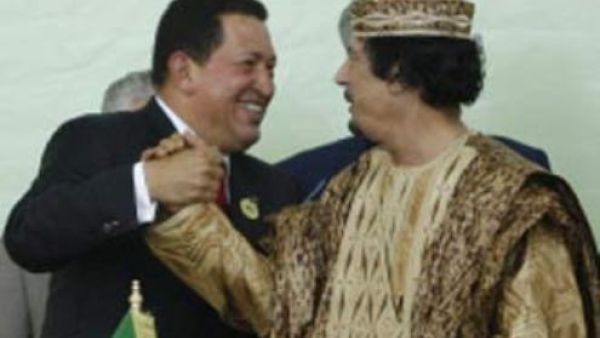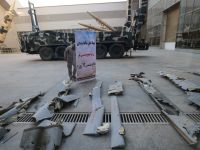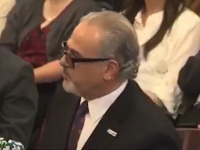Libya’s rebels pushed to strangle two supply lines to Tripoli Wednesday hoping to ratchet up pressure on the regime as their leaders prepared for the transition to democracy.
Rebels fought to sever Tripoli’s supply lines from Tunisia to the west and to Muammar Gaddafi’s hometown of Sirte, as they continued efforts to turn military victories into political pressure.
Fighting continued to the west of Tripoli at Zawiyah, with rebel officials claiming they were in control of “most” of the strategically vital oil port.
The town, which contains an oil refinery, “is being heavily shelled by Gaddafi forces from the east, but the population is not scared and will not leave,” said Colonel Ahmed Omar Bani, a military spokesman.
Bani added that the rebels were now pushing west toward the Tunisian border, an apparent bid to further strangle what limited supply lines remain.
“Zabrata and Sorman are now entirely under our control,” he said referring to two towns to the west of Zawiyah, adding there was fierce fighting on an inland road parallel to the main coastal route around the town of Ajaylat.
It was the latest in a series of operations to cut off the capital, which the rebels hope will force defections and spark an uprising against the regime.
Gaddafi forces late Wednesday were holding the refinery and harassing rebels with shelling and sniper fire.
“There are snipers inside the refinery facility. We control the gates of the refinery. We will be launching an operation to try to take control of it shortly,” said rebel fighter Abdulkarim Kashaba. Zawiyah’s refinery is one of the few sources of fuel for Gaddafi’s troops and people of Tripoli. A rebel commander said the pipeline linking it with Tripoli was severed Tuesday.
Gaddafi’s green flags were still flying from a refinery building and an electrical pylon. The rest of the city now flies the red, black and green flag of the rebels.
Streets were largely deserted apart from clusters of fighters and shops were shuttered. Medical workers said three people were killed and 35 injured Tuesday, mostly civilians.
Aided by NATO’s fighter-bombers, assault helicopters and naval blockade, the rebels have transformed the battle in the last few days after weeks of stalemate.
Meanwhile, a rebel spokesman from the rebel-held city of Misrata to the east of Tripoli said rebels had found the buried bodies of civilians slaughtered by Gaddafi forces.
“We discovered a mass grave containing 150 bodies in Tawargha. These are the corpses of civilians kidnapped from Misrata by Gaddafi’s loyalists,” he said. Rebels found a video “showing kidnappers cutting the throats of people,” he said.
The spokesman said rebel forces were now outside a place called Al-Heisha about 100 kilometers west of Misrata on the road to Tripoli. “They are now on the coastal road,” he said.
East of Tripoli rebels moved toward a town that links the capital and Sirte – Gaddafi’s hometown and a stronghold for his military.
“The scouting teams of the revolutionaries reached the outskirts of Al-Heisha after expelling Gaddafi forces,” the rebel military command said early Wednesday.
Al-Heisha lies 70 km south of Misrata and 250 km from Tripoli, near two key crossroads that link loyalist-held territory in the west with the oil-rich Sirte basin.
But with rebels spread thinly across a fragmented front around Tripoli, their assault represented a slight tightening of the noose rather than the chair being kicked from under Gaddafi feet.
Still, anticipating victory, Libya’s rebel leaders set out a fresh plan to transform the country from autocracy to a fully blown democracy, in a road map that could help define the country for decades to come.
The draft 14-page “constitutional declaration,” obtained by AFP Wednesday, plots a path – via the first elections seen in Libya since 1964 – to a new constitution and a multiparty democracy inspired by Islamic law.
“Libya is a democratic and independent state,” the document states, “the people are the source of authority, Tripoli is the capital, Islam is the religion and Islamic Shariah is the principal source of legislation.”
In 37 articles the text, drafted by the rebels’ de-facto government – the National Transitional Council – sets out key milestones along a roughly two-year path to democracy including an assembly election, a constitutional referendum and a general election.
Rebel military chief General Younes, a former interior minister and Gaddafi regime lynchpin, was assassinated July 28 after being recalled from the front line in Brega for questioning. His death remains shrouded in mystery.
“It is also important to put across to the people in Tripoli that they are not just a bunch of cowboys from the east,” Dalton added.
This carrot and stick approach from Benghazi toward the regime was underscored Tuesday when NTC head Mustafa Abdel Jalil sought to encourage regime defections, promising a fair trial for some and amnesty for others.
But the invitation did not extend to Gaddafi and his closest allies, naming Gaddafi’s son Seif al-Islam and intelligence chief Abdullah al-Senussi.
“Anyone who is accused, or has an [International Criminal Court] arrest warrant in his name will fall under international jurisdiction and we will not be able to accept immunity or amnesty for them.”
Earlier this week, Gaddafi’s Deputy Interior Minister Mabruk Abdallah flew from Tunisia to Egypt on a private plane with nine relatives, but it was not clear if he was defecting. Regime spokesman Mussa Ibrahim said merely that he had gone to Cairo for “personal reasons.”
Dozens of high-ranking officials have turned their back on Gaddafi since the pro-democracy uprising erupted, inspired by the so-called Arab Spring.
Abdel Jalil also ruled out negotiations with the regime and vowed a swift transfer of power once the veteran strongman is ousted.
He denied suggestions that members of the NTC had held talks in Tunisia with representatives of the Gaddafi regime.
“There are no negotiations, either direct or indirect, with the Gaddafi regime,” said NTC chief Abdel Jalil.
Rebel officials acknowledged there were some Libyan figures taking part in the talks, but insisted that they did not represent Benghazi.








